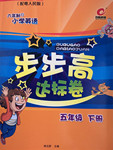题目内容
下面是一段短文,请你对其进行修改。文中共有10处错误,每句中最多有两处。错误涉及一个单词的增加、删除或修改。
增加:在缺词处加一个漏词符号(∧),并在此符号下面写出该加的词。
删除:把多余的词用斜线(\)划掉。
修改:在错的词下划一横线,并在该词下面写出修改后的词。
注意: 1.每处错误及其修改均仅限一词;
2.只允许修改10处,多者(从第11处起)不计分。
Xihaigu is in the southern part of the Ningxia Hui autonomous region. Locating on the Loess Plateau(黄土高原), it faces rain lack and extreme poor living conditions. The UN had regarded it as one place that is difficult to live in. So in spite of the tough conditions, there are quite few rural teachers who work there. They do your best to perform their various duty with great devotion. China currently has over to 3 million rural teachers teaching more than 40 million rural children. According by the Ministry of Education, between 2010 and 2013, the number of rural teachers falls from 4.73 million to 3.3 million.
 步步高达标卷系列答案
步步高达标卷系列答案Your school asked parents about the social development in children in the last Parents’ Meeting. Here are some opinions. Read the following information and answer the questions.
Parent 1: Social development in children is an important part of childhood. Social activities can help enhance children’s social abilities and make them more confident. | Parent 2: Social development should begin at a very early age. It is important for young children before starting school. Playing with other children can help them get skills needed to make new friends. |
Parent 3: Many ball games are a great way to encourage children to communicate with other kids. It’s a good idea for them to play basketball or football together. They can learn teamwork. | School headmaster: Parents should try to allow children to deal with the situation on their own first. Children can learn what works and what doesn’t work from their failures, which help children act properly in the future’s society. |
1. The underlined word “enhance” can be replaced by.
A. spend B. improve C. expect D. appreciate
2.What kind of activities may be supported by the third parent for his/her children?
A. Playing basketball with friends.
B. Playing computer games.
C. Holding parties at home.
D. Watching TV alone.
3. Which is NOT the advantage from social development according to these parents and headmaster’s opinions?
A. Children become more confident.
B. Children get skills needed to make new friends.
C. Children learn teamwork.
D. Children are afraid of making mistakes.

